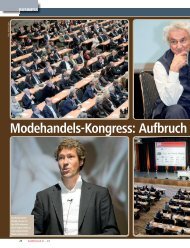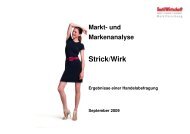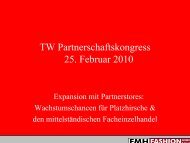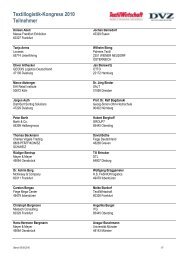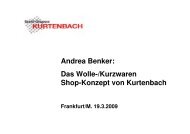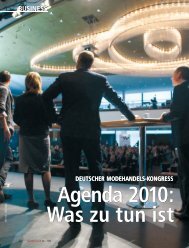UNIQLO Operations - TextilWirtschaft
UNIQLO Operations - TextilWirtschaft
UNIQLO Operations - TextilWirtschaft
You also want an ePaper? Increase the reach of your titles
YUMPU automatically turns print PDFs into web optimized ePapers that Google loves.
Compliance<br />
Compliance in Decision Making and Business Processes<br />
Our Code of Conduct<br />
In September 2004, FAST RETAILING set its Code of<br />
Conduct (CoC) and introduced it to all employees. As our<br />
business activities have become global in scope, we have<br />
also prepared English, Chinese, Korean, French versions<br />
in addition to the original Japanese-language version, and,<br />
as of the end of fiscal 2007, all Group companies* had<br />
adopted our CoC. We conduct training for employees to<br />
confirm the CoC once a year.<br />
*Excluding equity-method affiliates<br />
Compliance Hotline (Reporting/Counseling)<br />
In case employees have concerns about their work or<br />
become concerned about violations of the CoC, we have<br />
established a hotline to allow them to report their concerns<br />
and provide information as well as receive counseling on a<br />
confidential basis. All employees can use this hotline and<br />
receive advice from external legal counsel. Reports and the<br />
content of advice are kept in strict confidence, and, when<br />
necessary, the CoC committee decides on appropriate<br />
measures in response.<br />
Guidelines to Prevent Improper Behavior<br />
Based on Superior Positions<br />
FAST RETAILING believes that it must take the initiative in<br />
ensuring that it does not misuse its superior bargaining<br />
position. <strong>UNIQLO</strong> in particular, which has 790 stores<br />
around the world and orders large volumes of merchandise,<br />
is believed to be in a position to easily use its superior<br />
bargaining position against its partners. For this reason,<br />
<strong>UNIQLO</strong> established its Business Ethics Committee in<br />
2004 and has prepared Guidelines to Prevent Improper<br />
Behavior Based on Superior Positions. <strong>UNIQLO</strong> conducts<br />
periodic surveys to determine whether its employees are<br />
exerting improper pressure on its principal partners in<br />
Japan and overseas. The committee then gives guidance<br />
to units that appear to have problems in this area.<br />
Code of Conduct for Production Partners<br />
<strong>UNIQLO</strong> emphasizes compliance throughout its supply<br />
chain. With this in mind, in 2004, <strong>UNIQLO</strong> prepared a<br />
“Production Partner Code of Conduct” for its approximately<br />
70 principal production factories overseas, principally<br />
in China, and designated those factories that signed<br />
a pledge to abide by this CoC as its partner factories. At<br />
these facilities, a third party monitors activities, with the<br />
aims of protecting the human rights of the people<br />
employed by these factories and improving their response<br />
to environmental issues.<br />
If, as a result of monitoring activities, certain workplaces<br />
receive a classification of C (deficiencies in labor contracts,<br />
working hours, or other matters) or D (use of child<br />
labor or forced labor), <strong>UNIQLO</strong> visits these factories and<br />
provides advice. Factories that fail to receive ratings of A<br />
or B after their second monitoring are subject to cutbacks<br />
or the suspension in transactions.<br />
Quality and Safety of <strong>UNIQLO</strong> Products<br />
<strong>UNIQLO</strong> has formed quality and safety control teams in its<br />
Japan and Shanghai offices. They are responsible for confirming<br />
that all products meet <strong>UNIQLO</strong>’s internal standards<br />
for product quality and safety and for responding to<br />
customer inquiries regarding quality.<br />
Japan Industrial Standards (JIS) specifications have<br />
been adopted for all apparel products sold in Japan, and<br />
systems for inspection and supervision are in place to<br />
check on whether products meet <strong>UNIQLO</strong>’s even stricter<br />
quality and safety standards. In addition, since safety criteria<br />
outside Japan vary from country to country, <strong>UNIQLO</strong><br />
has established quality and safety standards that meet the<br />
standards of each country and has established systems<br />
for strict inspection and supervision. Samples of all materials<br />
used in <strong>UNIQLO</strong> products are subjected to inspections<br />
for safety (including inspections for the fastness of dyes,<br />
formalin, and other substances) by third-party public<br />
inspection agencies and other organizations. In addition,<br />
various inspections are carried out in the production and<br />
distribution stages.<br />
In the event that problems related to products are discovered,<br />
the safety of customers is confirmed, and investigations<br />
are conducted on the causes of these problems.<br />
Depending on the circumstances, <strong>UNIQLO</strong> may conduct<br />
recalls or suspend sales and production. In addition,<br />
<strong>UNIQLO</strong> discloses related information to its customers<br />
through its Website, newspapers, and other media.<br />
Testing for formalin conducted at partners’ factories<br />
FAST RETAILING ANNUAL REPORT 2007 39



